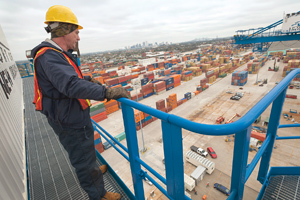Senior Reporter
Congestion at Ports Expected to Rise as Trade Grows

WASHINGTON — Tremendous trade growth in future years will exacerbate congestion at U.S. seaports unless innovation can keep costs from rising to the point that they endanger market share, experts said during a Transportation Research Board panel here.
With world trade of manufactured goods growing twice as fast as world GDP in recent years, it’s no surprise that congestion has “picked up big time” at U.S. container ports, Walter Kemmsies, chief economist at New York City-based Moffatt and Nichol, said at a Jan. 13 session during TRB’s annual meeting.
“The world wants to trade as long as the cost doesn’t get out of hand,” Kemmsies said. “And right now, I think that the way the structure of freight flows are set up around the world, we’ve got to face the possibility of the cost getting out of hand.”
The good news is that terminal operators are doing a “very, very good job of innovating,” according to Kemmsies.
“The problem we have is that a lot of the investment in improving flows inside the terminals is not matched by investments and innovation outside the terminals,” Kemmsies said. “And therefore, the better the ports work, the worse it is for the other segments of the supply chain.”
Kemmsies said that over the next five to 10 years, economists expect continued growth in U.S. exports.
“For the last few decades, we’ve gotten used to bringing boxes full of goods from other countries into the U.S., dumping the goods out and sending the boxes back empty,” Kemmsies said.
But now that U.S. exports have picked up and have potential to continue to grow, “empty container repositioning is going to be the big logistics nightmare of the next decade.”
While the ports of Los Angeles and Long Beach, the nation’s largest complex, already are wrestling with congestion, chassis and empty-container management, things could get tougher as the volume of containers doubles over the next 25 years, according to panelist Mark Jensen, a principal in Cambridge Systematics Inc.
“Already it’s caused diversion, but eventually it’s going to cost market share in California if these problems cannot be solved,” Jensen said.

